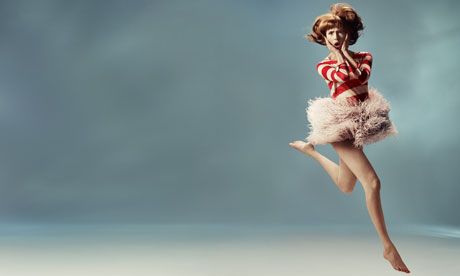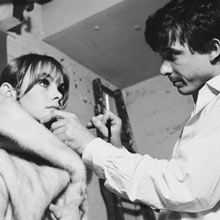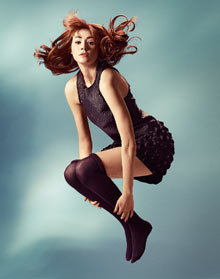According to Matt Smith the actor is Doctor Who's 'sexiest companion ever' and now she is to play Jean Shrimpton. Here, she talks about her obsession with the 60s – and why she wishes she could make everyone fall in love

Karen Gillan: 'If I wasn’t an actor, I’d be a hypnotist. I’d make people feel like they are in love'. Photograph: Alan Clarke for the Observer
One freezing week in 1962, David Bailey took 18-year-old Jean Shrimpton and a sad-eyed teddy bear to Harlem, where he shot a Voguefashion story that would change fashion photography for ever. The pictures still look modern: a glossy black-and-white spread of the Brooklyn Bridge, raw and stark and angry, with that innocuous yet sinister teddy bear underlining Shrimpton's innocence. That week, Bailey (an arrogant, married 23-year-old) and Shrimpton (a flighty Buckinghamshire farm girl) fell in love – this month BBC4 airs We'll Take Manhattan, the dramatisation of that affair. Karen Gillan, best known asDoctor Who's sidekick Amy Pond (Matt Smith pronounced her "the sexiest companion ever") plays "the Shrimp", and she plays her with jutted elbows and a determined stare. In real life, Gillan has the energy of a soluble aspirin – she fizzes. She squeaks.
Born in Inverness 23 years ago, Gillan moved to London to study drama; before Doctor Who she worked as a model after being spotted working behind the bar of a pub. "But I never cared about modelling," she says. "As a model you're powerless." In a rare interview last year, Shrimpton herself (now, at 69, the owner of a hotel in Penzance) said a similar thing: "I never liked being photographed. I just happened to be good at it." What Gillan likes is acting. "Seeking a live response," she says, and flutters her hands near her mouth as if to waft away any perceived pretension.
She is aggressively tall and ceramic-pale; her eyes widen to round plates when she's excited, and she holds eye contact instinctively. "I'm obsessed with the 1960s," she says, "It was the last revolution!" and her eyes expand, greenly. As well as playing Shrimpton she recently appeared at the Donmar in John Osborne's Inadmissable Evidence, written in 1964. "Back then women had the crazy notion that they should just work until they had a baby. Like they were just killing time, dedicating their lives to marriage. I'm interested in that bit of time before – the bit when they were expected just to hang around, waiting…"
We'll Take Manhattan is a portrait of a photogenic love affair, but lit with flashes of class anxiety and period misogyny. While Shrimpton is portrayed as a beguiling ingénue, a muse who says little but looks great, Bailey (played by Aneurin Barnard) is the domineering, hostile "artist", who shouts threateningly at women, uses Shrimpton and forgets his wife. I'll say it – Bailey comes off like a bit of a dick, doesn't he? Gillan's eyebrows raise. "Oh!" she says. "Umm. Well. He's not polite," she agrees. "He's cocky, he's arrogant. But he adores her. He puts her on a pedestal. He likes her imperfections."
Shrimpton with David Bailey in 1963. Photograph: Terry O'Neill When David Bailey himself shot Gillan and Barnard for a Voguefeature last year he sent her back to the make-up chair twice, saying: "Her eyes should be rounder and sadder." In the film he tells her he likes her eyes with shadows underneath, after she's been awake all night crying over him. "Like I said, as a model you are powerless, but the two of them collaborated on the work."
Does Gillan think Shrimpton comes off as strong, in the relationship? "Models are talked about, not to. That's still the way it is. But Jean walked out on her dad [when he objected to her affair with a married man] which shows she had bite. I think she was fierce. Quietly fierce." Gillan grins. She says she identified most with the pre-Bailey Shrimpton, "a girl on the brink of becoming a woman. Playing her has taught me I'm stronger than I thought I was, and to appreciate the opportunities I've got – she was one of the ones who pursued a career, one of the ones who changed things for people like me."
Karen Gillan. Gillan is what she describes as "stable" – she's in a long-term relationship, she is close to her parents (her mother is a staunch Whovian – she owns Dalek bubble bath), and to her friends in Inverness: "One's a cleaner, one's a carer in an old people's home, but I dip in and out of the 'scene' in London, too. It freaks me out though – going out every night clutters my head."
What clears it? What does she find relaxing? "Space!" Space? As in… "Space! I went to the Royal Observatory the other day, and looked through the biggest telescope in the UK. I saw a star from 47 years in the past. Hang on…" She leaps up to find her phone and shows me her screensaver, a photo of Saturn.
"Yep, space excites me. My dream is to go to space. And dreams – I find the meanings of dreams very interesting. And the brain. Did you know the brain has three layers, and when we're drunk, we revert to the bottom layer, which is only interested in eating, sleeping and 'meeting a partner'. And music connects to that layer, that bottom layer! Did you know that?" No! What would she be if not an actor? Would she go back to college, study science? "I'd be a hypnotist, like Paul McKenna. I'd make people feel like they are in love."
Gillan as Amy Pond in Doctor Who. Though she's "relieved" to be leaving Dr Who in the next series, there's some time before she has to think about a career change. However much she tries to suppress it – staying off the red carpets, staying out of the taxis and arms of fellow actors – her fame is growing. She is just back from meetings in LA, "which were pretty weird, actually. In Britain they try and actually dissect your personality – over there they just want to see what you can do."
Can she imagine moving out to Hollywood? What would she do? How would she change? She thinks for a second, and curls a wisp of her ketchup-coloured hair around a long white finger. "I think," she says, slowly, "I think I'd stay in the shade."
Born in Inverness 23 years ago, Gillan moved to London to study drama; before Doctor Who she worked as a model after being spotted working behind the bar of a pub. "But I never cared about modelling," she says. "As a model you're powerless." In a rare interview last year, Shrimpton herself (now, at 69, the owner of a hotel in Penzance) said a similar thing: "I never liked being photographed. I just happened to be good at it." What Gillan likes is acting. "Seeking a live response," she says, and flutters her hands near her mouth as if to waft away any perceived pretension.
She is aggressively tall and ceramic-pale; her eyes widen to round plates when she's excited, and she holds eye contact instinctively. "I'm obsessed with the 1960s," she says, "It was the last revolution!" and her eyes expand, greenly. As well as playing Shrimpton she recently appeared at the Donmar in John Osborne's Inadmissable Evidence, written in 1964. "Back then women had the crazy notion that they should just work until they had a baby. Like they were just killing time, dedicating their lives to marriage. I'm interested in that bit of time before – the bit when they were expected just to hang around, waiting…"
We'll Take Manhattan is a portrait of a photogenic love affair, but lit with flashes of class anxiety and period misogyny. While Shrimpton is portrayed as a beguiling ingénue, a muse who says little but looks great, Bailey (played by Aneurin Barnard) is the domineering, hostile "artist", who shouts threateningly at women, uses Shrimpton and forgets his wife. I'll say it – Bailey comes off like a bit of a dick, doesn't he? Gillan's eyebrows raise. "Oh!" she says. "Umm. Well. He's not polite," she agrees. "He's cocky, he's arrogant. But he adores her. He puts her on a pedestal. He likes her imperfections."
Shrimpton with David Bailey in 1963. Photograph: Terry O'Neill When David Bailey himself shot Gillan and Barnard for a Voguefeature last year he sent her back to the make-up chair twice, saying: "Her eyes should be rounder and sadder." In the film he tells her he likes her eyes with shadows underneath, after she's been awake all night crying over him. "Like I said, as a model you are powerless, but the two of them collaborated on the work."
Does Gillan think Shrimpton comes off as strong, in the relationship? "Models are talked about, not to. That's still the way it is. But Jean walked out on her dad [when he objected to her affair with a married man] which shows she had bite. I think she was fierce. Quietly fierce." Gillan grins. She says she identified most with the pre-Bailey Shrimpton, "a girl on the brink of becoming a woman. Playing her has taught me I'm stronger than I thought I was, and to appreciate the opportunities I've got – she was one of the ones who pursued a career, one of the ones who changed things for people like me."
Karen Gillan. Gillan is what she describes as "stable" – she's in a long-term relationship, she is close to her parents (her mother is a staunch Whovian – she owns Dalek bubble bath), and to her friends in Inverness: "One's a cleaner, one's a carer in an old people's home, but I dip in and out of the 'scene' in London, too. It freaks me out though – going out every night clutters my head."
What clears it? What does she find relaxing? "Space!" Space? As in… "Space! I went to the Royal Observatory the other day, and looked through the biggest telescope in the UK. I saw a star from 47 years in the past. Hang on…" She leaps up to find her phone and shows me her screensaver, a photo of Saturn.
"Yep, space excites me. My dream is to go to space. And dreams – I find the meanings of dreams very interesting. And the brain. Did you know the brain has three layers, and when we're drunk, we revert to the bottom layer, which is only interested in eating, sleeping and 'meeting a partner'. And music connects to that layer, that bottom layer! Did you know that?" No! What would she be if not an actor? Would she go back to college, study science? "I'd be a hypnotist, like Paul McKenna. I'd make people feel like they are in love."
Gillan as Amy Pond in Doctor Who. Though she's "relieved" to be leaving Dr Who in the next series, there's some time before she has to think about a career change. However much she tries to suppress it – staying off the red carpets, staying out of the taxis and arms of fellow actors – her fame is growing. She is just back from meetings in LA, "which were pretty weird, actually. In Britain they try and actually dissect your personality – over there they just want to see what you can do."
Can she imagine moving out to Hollywood? What would she do? How would she change? She thinks for a second, and curls a wisp of her ketchup-coloured hair around a long white finger. "I think," she says, slowly, "I think I'd stay in the shade."



No comments:
Post a Comment